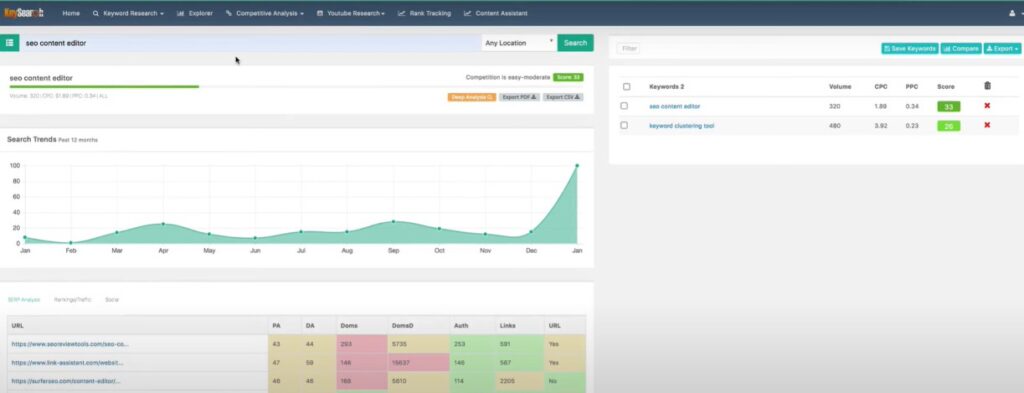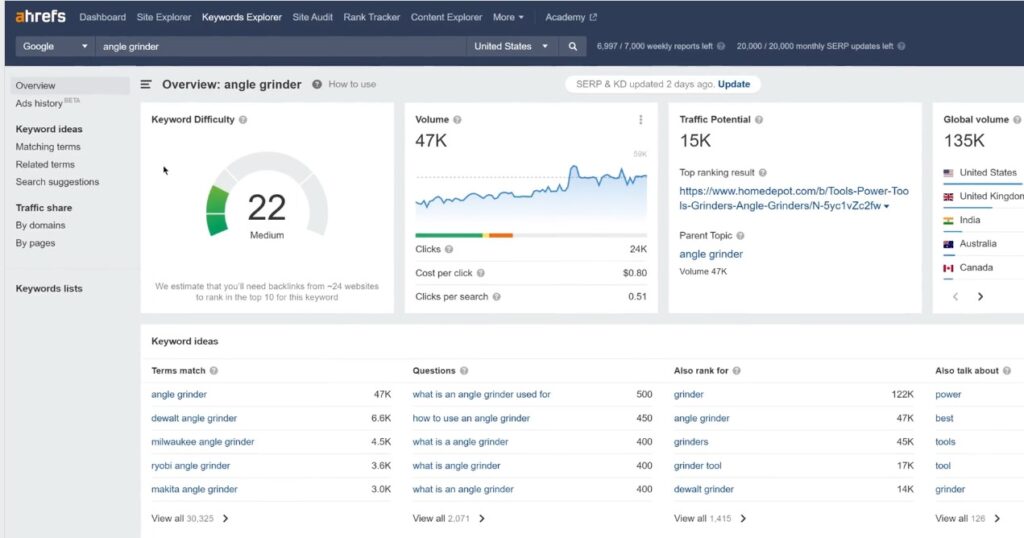In the ever-evolving landscape of digital marketing, search engine optimization (SEO) stands as a cornerstone for online success. As businesses and individuals strive to enhance their online visibility, the choice of the right SEO tool becomes paramount. In this comprehensive comparison, we will closely examine Keysearch and Ahrefs as two popular SEO solutions, analyzing their features, functionalities, and unique strengths.
Whether you are a seasoned SEO professional or a newcomer to the field, this guide aims to provide you with insights to make an informed decision, aligning your choice with your goals and aspirations.
1. Pricing and Plans:
One of the initial considerations when evaluating SEO tools is the pricing structure they offer. Both Keysearch and Ahrefs provide a range of plans to cater to diverse user needs and budgets.
Keysearch presents itself as a cost-effective option, making it an attractive choice for individuals and small businesses. Their pricing structure is designed with simplicity in mind, offering two main plans: the Starter Plan and the Pro Plan. The Starter Plan, priced at $17, provides essential features such as keyword research, rank tracking, and competitor analysis. For those seeking more advanced functionalities, the Pro Plan, priced at $34, unlocks additional features such as YouTube research and content optimization tools.

On the other hand, Ahrefs offers a comprehensive suite of tools with a slightly higher price range. Their pricing model consists of several tiers, including the Lite Plan, Standard Plan, Advanced Plan, and Agency Plan. The Lite Plan, starting at $89, provides access to basic features like keyword research and backlink analysis. As you progress to higher tiers, you’ll gain access to more robust functionalities, such as site audit, content explorer, and rank tracking.

Comparing the pricing structures of Keysearch and Ahrefs, it’s evident that Keysearch positions itself as a budget-friendly option, while Ahrefs offers a more extensive range of features across its plans. The choice between the two ultimately depends on your specific requirements, whether you’re seeking fundamental SEO tools or a comprehensive suite of advanced functionalities.
As you explore the pricing and plans of both Keysearch and Ahrefs, remember that your choice should be a balance between the tools’ capabilities and your financial considerations. It is wise to evaluate which features align with your SEO goals and select a plan that provides optimal value for your investment. In the following sections, we will dive into other critical aspects of these tools, guiding you towards an informed decision that drives your SEO efforts to new heights.
2. Keyword Research
Keysearch is designed to simplify the process of keyword discovery. With its intuitive interface, users can enter a seed keyword and instantly receive a plethora of related keyword suggestions. The tool provides essential data such as search volume, competition, and trends, enabling users to identify keywords that hold potential for driving traffic and conversions.

Ahrefs takes keyword research to a deeper level. Its Keyword Explorer provides comprehensive insights into keyword difficulty, click-through rates, and parent topics. The tool also offers a “Parent Topic” feature that aids in finding semantically related keywords, enhancing your content’s relevance and potential to rank higher.

Keysearch’s user-friendly interface makes it suitable for beginners, while Ahrefs offers a more comprehensive suite of tools for advanced users. Whether you are looking for a quick keyword brainstorm or an in-depth analysis, both tools have you covered.
3. Backlink Analysis
Backlinks, also known as incoming links, play a pivotal role in SEO by influencing your website’s authority and search engine rankings. Both Keysearch and Ahrefs offer robust tools for analyzing backlinks, helping you understand your link profile and identify opportunities for improvement.
Keysearch’s backlink analysis feature provides insight into your website’s backlink profile. It offers data on referring domains, anchor text, and the authority of linking websites. This information can help you gauge the quality of your backlinks and identify potential areas for optimization. While not as extensive as Ahrefs, Keysearch still offers valuable information for those seeking to refine their link strategy.
Ahrefs is renowned for its comprehensive backlink analysis capabilities. With its “Site Explorer” tool, you can delve deep into your backlink profile, examining the number of referring domains, the quality of backlinks, and the anchor text distribution. A unique feature is Ahrefs’ ability to assess the health of your backlink profile, helping you identify and disavow potentially harmful links. This level of detail empowers you to make informed decisions about your link-building strategy.
When comparing Keysearch and Ahrefs for backlink analysis, the depth and accuracy of data should be key considerations. Ahrefs’ extensive backlink database and advanced features make it a go-to-choice for serious link analysis, while Keysearch’s offering can still provide valuable insights for those looking to begin their backlink optimization journey.
Please remember that a strategic approach to link building can contribute significantly to your website’s authority and search engine performance. By leveraging the insights provided by these tools, you can identify link-building opportunities, monitor your progress, and enhance your website’s visibility in search results.
4. Rank Tracking
Monitoring your website’s search engine rankings is a fundamental aspect of SEO, allowing you to assess the effectiveness of your optimization efforts. Keysearch and Ahrefs offer robust rank tracking tools that enable you to keep a close watch on your website’s performance in search engine results pages (SERPs).
Keysearch provides a straightforward rank tracking feature that allows you to monitor the positions of your target keywords in search results. The tool provides regular updates on your rankings, enabling you to track progress over time. While it may not offer the depth of features found in Ahrefs, Keysearch’s rank tracking is valuable for users seeking a simpler approach to monitoring keyword performance.
Ahrefs’ rank tracking capabilities are more extensive, providing in-depth insights into keyword rankings. With its “Rank Tracker” tool, you can monitor rankings for multiple keywords across various search engines. Ahrefs offers features like historical ranking data, localized tracking, and the ability to track specific URLs. This allows you to gain a comprehensive understanding of how your website is performing in different geographic regions and on different devices.
When evaluating Keysearch and Ahrefs for rank tracking, consider the level of detail you require to monitor your website’s performance. Keysearch’s straightforward approach may suit those seeking basic rank tracking, while Ahrefs’ comprehensive insights can be valuable for professionals aiming to make data-driven decisions based on detailed historical trends.
Please remember that keeping a close eye on your website’s rankings is essential for refining your SEO tactics. By utilizing these tools’ rank tracking features, you can adjust your strategy, optimize your content, and strive for continuous improvement in search engine visibility.
5. Competitor Analysis
Understanding your competitors’ strategies and performance is a key element of SEO success. Both Keysearch and Ahrefs provide tools that enable you to delve into your rivals’ digital footprint, giving you valuable insights for refining your own approach.
Keysearch’s competitor analysis feature allows you to gain a snapshot of your competitors’ SEO efforts. By entering a competitor’s URL, you can uncover valuable information such as their top-ranking keywords, backlink profiles, and estimated organic traffic. This data helps you identify areas where your competitors excel and areas where you can potentially outperform them.
Ahrefs’ “Competing Domains” and “Competing Pages” features offer a more in-depth analysis of your competitors. These tools provide a comprehensive view of your competitors’ top-performing content, their organic keywords, and the backlinks they have acquired. Ahrefs also offers the ability to track your competitors’ keyword rankings over time, giving you a dynamic perspective of their search engine performance.
When evaluating Keysearch and Ahrefs for competitor analysis, consider the level of detail you need to effectively understand and strategize against your rivals. Keysearch’s simpler approach can provide quick insights, while Ahrefs’ more extensive features may appeal to professionals aiming to gain a comprehensive competitive edge.
By leveraging the competitor analysis capabilities of Keysearch and Ahrefs, you equip yourself with the tools to stay ahead in the dynamic world of SEO. These insights allow you to fine-tune your strategies, capitalize on untapped opportunities, and position yourself for success in the digital landscape.
As we move forward, we will explore how Keysearch and Ahrefs can help you enhance your website’s health and performance for improved search engine rankings.
6. Site Audit and Technical SEO
Optimizing your website’s technical elements is crucial for ensuring optimal performance and search engine visibility. Keysearch and Ahrefs offer tools to conduct comprehensive site audits, enabling you to identify and rectify issues that might hinder your website’s success.
Keysearch’s site audit feature allows you to assess your website’s health in terms of technical SEO. It scans your site for potential issues such as broken links, duplicate content, and page speed concerns. The tool provides actionable insights to help you enhance your website’s user experience and search engine crawlability, which are critical factors for better search rankings.
Ahrefs’ site audit tool offers a more comprehensive analysis of your website’s technical aspects. It evaluates factors like internal and external links, crawlability, and mobile friendliness. The tool also provides recommendations to fix identified issues, allowing you to prioritize improvements that have a direct impact on your SEO performance.
When comparing Keysearch and Ahrefs for site audit and technical SEO, consider the level of detail you require for your website’s optimization. Keysearch’s simpler approach may be suitable for basic site health checks, while Ahrefs’ more extensive insights can benefit professionals aiming for a thorough technical analysis.
By utilizing the site audit and technical SEO tools offered by Keysearch and Ahrefs, you ensure that your website is well-optimized for search engines and users alike. These insights empower you to enhance your website’s overall performance, providing a solid foundation for improved search rankings and organic traffic.
As we progress in our exploration, we will venture into the user interface and ease of use provided by Keysearch and Ahrefs. These aspects are essential for efficient navigation and utilizing the tools to their fullest potential.
7. User Interface and Ease of Use
User Interface and Ease of Use: A user-friendly interface is essential for maximizing the effectiveness of any SEO tool. Keysearch and Ahrefs understand the importance of intuitive navigation and accessibility, offering interfaces designed to make your SEO journey seamless.
Keysearch’s user interface is designed with simplicity in mind. Navigating through its features and functionalities is straightforward, making it an excellent choice for beginners. The dashboard’s organization ensures that key tools are easily accessible, allowing you to perform tasks such as keyword research, rank tracking, and backlink analysis with ease.
Ahrefs’ user interface is renowned for its depth and versatility. While it offers a comprehensive range of tools, it may have a steeper learning curve due to the extensive functionalities. However, Ahrefs provides in-depth tutorials and resources to aid users in mastering its interface. Once familiarized, Ahrefs empowers you to harness its advanced features for intricate analyses and optimizations.
When evaluating Keysearch and Ahrefs for user interface and ease of use, consider your familiarity with SEO tools and your preference for simplicity versus depth. Keysearch’s streamlined interface may be preferred by those seeking a user-friendly experience, while Ahrefs’ more intricate interface may suit professionals who prioritize a comprehensive suite of features.
A seamless user experience not only enhances your efficiency but also ensures that you can utilize the tools to their fullest potential. By capitalizing on the intuitive interfaces of Keysearch and Ahrefs, you set the stage for effective SEO strategies and informed decision-making.
Stay engaged as we move forward to explore the realm of customer support and resources provided by Keysearch and Ahrefs. These aspects are vital for ensuring that you receive timely assistance and guidance on your SEO journey.
8. Customer Support and Resources
Having access to reliable customer support and educational resources is essential when using complex SEO tools. Keysearch and Ahrefs recognize the importance of assisting users in their journey, offering a range of support options and learning materials.
Keysearch provides customer support through a ticketing system and a knowledge base. While it may not offer extensive live support, its knowledge base contains tutorials, FAQs, and guides to help users navigate the tool effectively. This resource hub ensures that users can find solutions to common queries and learn about Keysearch’s features at their own pace.
Ahrefs stands out with its comprehensive support and educational offerings. It offers email support and a responsive community forum where users can seek assistance and share insights. Additionally, Ahrefs provides detailed tutorials, video guides, and webinars that cover various aspects of the tool’s functionalities. This abundance of resources ensures that users can fully utilize Ahrefs’ capabilities.
When evaluating Keysearch and Ahrefs for customer support and resources, consider your preference for self-guided learning versus interactive assistance. Keysearch’s knowledge base is suitable for those who prefer independent exploration, while Ahrefs’ array of support options caters to those who value a combination of self-learning and direct assistance.
The availability of robust customer support and educational resources enhances your experience with Keysearch and Ahrefs, ensuring that you can overcome challenges, learn about advanced features, and make the most of these powerful SEO tools.
As we progress in our exploration, we will delve into additional features that set Keysearch and Ahrefs apart, providing a holistic view of the capabilities offered by these two SEO tools.
9. Additional Features
Beyond their core functionalities, Keysearch and Ahrefs offer unique features that can enhance your SEO strategy and provide a competitive edge in the digital landscape.
Keysearch offers a variety of additional features that cater to various aspects of SEO. Notably, it provides a “Content Assistant” tool that assists in optimizing your content for target keywords. This feature suggests keyword usage, content structure, and word count recommendations to maximize the relevance and impact of your content. Additionally, Keysearch offers a YouTube keyword research tool, which can be valuable for creators aiming to optimize video content.
Ahrefs stands out with its “Content Explorer” feature, allowing you to search for popular content based on keywords, topics, or domains. This feature aids in content research, competitor analysis, and identifying content gaps in your niche. Ahrefs also offers a “Content Gap” tool, which helps you identify keywords that your competitors rank for, but you do not. This information is invaluable for refining your content strategy.
When comparing Keysearch and Ahrefs for additional features, think about the specific needs of your SEO strategy. Keysearch’s focus on content optimization and YouTube research is beneficial for content creators, while Ahrefs’ content research and gap analysis tools cater to a broader range of users seeking insights for comprehensive SEO strategies.
By leveraging these additional features offered by Keysearch and Ahrefs, you can go beyond traditional SEO techniques, refine your content strategy, and capitalize on opportunities that might otherwise remain hidden. These tools empower you to make data-driven decisions and stand out in the competitive online landscape.
As we near the conclusion of our exploration, we will take a moment to consider user feedback and reviews for both Keysearch and Ahrefs. This insight can provide valuable perspectives from real users, aiding in your decision-making process.
10. User Feedback and Reviews
Listening to the experiences and opinions of real users can provide invaluable insights into the practical use and effectiveness of SEO tools like Keysearch and Ahrefs. Let us explore user feedback and reviews to help you gauge the strengths and weaknesses of these tools.
User feedback on Keysearch often highlights its user-friendly interface, affordability, and ease of use. Many users appreciate its straightforward keyword research and rank tracking functionalities, making it an excellent choice for beginners and smaller businesses. However, some users may find its backlink analysis and advanced features relatively limited compared to more comprehensive tools.
Ahrefs’ reviews often emphasize its robust features, extensive data, and advanced capabilities. Users value its in-depth backlink analysis, keyword research tools, and competitive insights. Professionals and larger businesses particularly appreciate Ahrefs’ ability to provide comprehensive data for intricate SEO strategies. However, a potential drawback mentioned by some users is its higher pricing, which might be a consideration for smaller businesses or individuals.
When assessing user feedback and reviews for Keysearch and Ahrefs, it is crucial to align the pros and cons with your specific needs and goals. Keysearch’s strengths in affordability and simplicity might be attractive if you are new to SEO, while Ahrefs’ robust capabilities might be more appealing if you are seeking a comprehensive solution for advanced SEO strategies.
By considering user feedback and reviews, you gain a well-rounded perspective on the practical application of Keysearch and Ahrefs. This knowledge equips you with the ability to make an informed decision that aligns with your unique requirements and aspirations.
As we approach the conclusion of our comparison between Keysearch and Ahrefs, let’s recap the key takeaways and considerations to help you make the right choice for your SEO journey.
Conclusion: Who is the winner?
In the dynamic world of SEO, choosing the right tool can significantly impact your online success. Keysearch and Ahrefs both offer valuable features that cater to various needs and goals. Let us recap the key takeaways and considerations to help you make an informed decision between these two powerful tools.
Keysearch stands out for its affordability, making it an attractive choice for individuals, small businesses, and beginners. Its user-friendly interface simplifies keyword research and rank tracking, providing essential tools for those starting their SEO journey.
Ahrefs shines in its robust features and comprehensive data analysis. It offers in-depth keyword research, backlink analysis, and competitor insights, making it a preferred option for professionals, larger businesses, and advanced SEO strategies.
Keysearch’s simplicity in navigation and self-guided learning resources make it an excellent choice for those who value ease of use and independent exploration. Ahrefs’ comprehensive tutorials, videos, and community forum cater to a range of users seeking various levels of support.
When considering your budget and investment, weigh the features and capabilities of both tools against your financial considerations. Keysearch’s affordability may be suitable if you are looking for essential features without a significant financial commitment. Ahrefs’ higher pricing reflects its extensive functionalities, making it a preferred option for businesses with a larger budget.
Assess the depth of your SEO strategy when choosing between Keysearch and Ahrefs. Keysearch’s simplicity is conducive to basic SEO needs, while Ahrefs’ advanced features are advantageous for those aiming for a comprehensive and sophisticated approach.
Gathering insights from real users through feedback and reviews can provide valuable perspectives. Pay attention to user experiences that align with your goals and requirements.
The choice between Keysearch and Ahrefs depends on your specific needs, goals, proficiency level, and budget. Assess your priorities, consider the factors discussed in this comparison, and explore the trial versions of both tools to experience their functionalities firsthand.
Both Keysearch and Ahrefs have demonstrated their strengths and capabilities throughout this comparison. Whichever tool you choose, remember that success in SEO hinges on consistent effort, informed strategies, and leveraging the insights these tools provide. May your SEO journey be fruitful and rewarding as you work towards achieving your online goals.
Both Keysearch and Ahrefs offer trial versions that allow you to experience their features firsthand. Take advantage of these trials to explore their functionalities and assess how they can enhance your SEO strategy.
Clarify your SEO goals and priorities. Are you looking for an affordable solution for basic keyword research and tracking? Keysearch might be the right fit. If you need a comprehensive suite of tools for advanced strategies, Ahrefs could be your go-to choice.
Do not wait – dive into the world of SEO armed with the right tool. Choose between Keysearch and Ahrefs and embark on a journey towards improved search rankings, increased organic traffic, and online success.
The path to effective SEO starts now. Choose your tool and let the journey begin!



